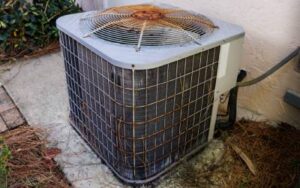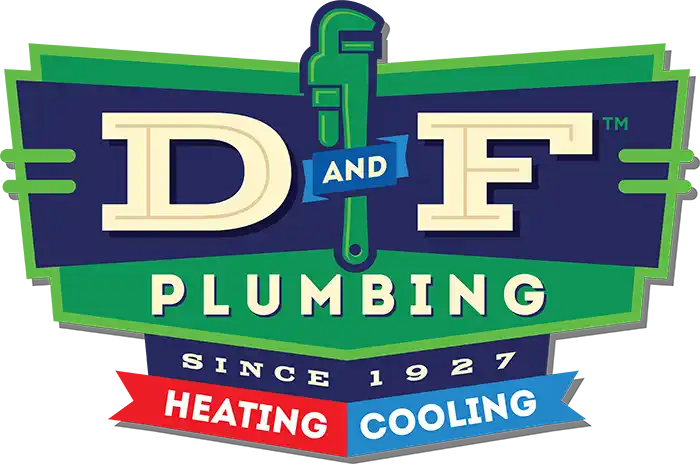 With certain things it’s easy to know when it’s time for a replacement. For example, the bristles on your toothbrush get scraggly or your brake pads start making a high-pitched whining as you back down your driveway. But how are you supposed to know when it’s time to replace your air conditioner?
With certain things it’s easy to know when it’s time for a replacement. For example, the bristles on your toothbrush get scraggly or your brake pads start making a high-pitched whining as you back down your driveway. But how are you supposed to know when it’s time to replace your air conditioner?
On one hand, you don’t want to be wasteful and retire your existing AC if it still has a lot of life left. On the other, you’ll want to upgrade before it gets old and the breakdowns start becoming more frequent. Plus, newer units are much more energy-efficient. So, when is the best time to replace an aging AC? It’s not an exact science, but in this blog, we’ll share some signs that your air conditioner needs replacement.
Are There Obvious Signs That Your AC Needs Replacement?
Wouldn’t it be awesome if there was some definitive way you could tell that your air conditioner had reached retirement age? Like, it lit up a flashing neon sign that said “I’m permanently broken”? Or it started leaving Werther’s Originals wrappers all over the place?
Unfortunately, the signs are rarely so obvious, so here are 7 subtle signs that you might want to consider replacing your AC:
- Age: If an old person ever tells you, “age is just a number,” just keep your lips zipped. There’s no need to shatter that dream. When it comes to your AC, however, age matters. Most AC systems start getting squirrely at about 10 to 15 years old. Breakdowns become more frequent, repairs get more expensive.
- Reduced efficiency: Has your energy bill gone up recently? Those fat cats over at the power utility might have raised prices again, or it might be your AC. We mentioned it before but it bears repeating: your air conditioner is among the most expensive appliances in your home to operate. Don’t underestimate the effect that a loss in efficiency can have on your energy bill. That’s why air conditioner maintenance in the spring is always a good idea.
- Uneven cooling: Your air conditioner system was designed to cool the whole house uniformly. If it struggles to do so, you might find yourself turning the thermostat lower to compensate. This can put strain on your system and cause your energy bill to surge.
- Frequent repairs: There’s nothing worse than an AC component failing, getting it fixed, only for a different component to fail next month and cause another breakdown. But that’s what happens. Your air conditioner has many components, all of which become less reliable as they age.
- Unusual noises: You know what your air conditioner sounds like normally. If you hear anything out of the ordinary, like a ratting, clanging, or louder-than-usual-volume, it’s a clear sign that something isn’t working and it’s time for either a repair or replacement. Think of it this way: if your AC is coughin’, it might be time for the coffin.
- Poor indoor air quality: Does something smell funny? Your air conditioner may be to blame. Not only that, but it might also be affecting the indoor air quality in your home.
- Leaking refrigerant: Are you having to recharge your air conditioner with freon frequently? You might have a leak in your system. These can be harmful to the environment and, depending on the nature of the leak, costly. Sometimes, it makes more sense to replace the AC rather than fix the leak.
An HVAC Offer You Can’t Refuse
Imagine your previously reliable AC suddenly breaks down and you’re confronted with a higher-than-expected repair bill. Should you pony up for the repair or spring for a replacement? Our general guidance is that if your AC is about ten to 15 years old and the repair is about 50% of the cost of a new one, consider getting the new one.
This summer, however, the math is different. With savings in the form of tax credits offered by the Inflation Reduction Act, the decision to upgrade is a lot easier than you think. Check out these tax credits for individual HVAC and water heater upgrades:
- Central Air Conditioners Tax Credit | Up to $600 Available
- Heat Pump Water Heaters Tax Credit | Up to $2,000 Available
- Water Heaters (Natural Gas) Tax Credit | Up to $600 Available
Additionally, households can qualify for a maximum of up to $8,000 for a heat pump space heater system! What are you waiting for? Sure, we get it, you’ve had some great times with your old AC. You’ve been through a lot together. But this isn’t personal – it’s business. It’s time to send your old AC to sleep with the fishes.
What is the Best Month to Replace Your AC?
If you’re already aware that your air conditioner has one foot in the grave, don’t prolong the inevitable. Get it replaced in March, April, or May – before the weather really starts heating up. That way you get to enjoy your new AC and its energy-saving efficiency all summer long.
Of course, you don’t always know that your air conditioner is about to kick the bucket. So, if your air conditioner breaks down in August, then August is by far the best month to get it replaced. Air conditioner breakdowns do tend to be more common at the height of summer, though, which can lead to greater demand. Replacing your air conditioner during the spring means you don’t have to wait to get on the AC repair company’s schedule during the busy summer months.
Replace Your AC System This Summer with D&F Plumbing, Heating and Cooling!
With the government tax credits available and the mercury rising in the Portland area, one could argue that this is the greatest time in human history to get an AC replaced. Think back on everything that has happened for civilization to lead us here. Homo sapiens invent the wheel. Hammurabi writes his code of laws. The Roman Empire. The Renaissance. The War of 1812. The Wright Brothers take flight at Kittyhawk. All of it… culminating in your state-of-the-art new air conditioner.
Don’t miss out on this veritable Golden Age of air conditioner replacements – call the experienced HVAC experts at D&F Plumbing, Heating and Cooling today.




